 Way back in the American Colonial days, Great Brittan passed a law that allowed the East India Tea company to export tea directly to America. This act reduced taxes on tea in Brittan to provide economic advantage to the East India Tea Company and caused taxes in America, including those on tea, to be raised. We Americans felt that we had a right to have a say in the taxes we paid and rebelled by putting on Indian costumes and throwing an entire shipload of tea into Boston Harbor. As the catchy chant of "no taxation without representation" allegedly took hold, several economic escalations meant that this act eventually resulted in the American Revolution.
Way back in the American Colonial days, Great Brittan passed a law that allowed the East India Tea company to export tea directly to America. This act reduced taxes on tea in Brittan to provide economic advantage to the East India Tea Company and caused taxes in America, including those on tea, to be raised. We Americans felt that we had a right to have a say in the taxes we paid and rebelled by putting on Indian costumes and throwing an entire shipload of tea into Boston Harbor. As the catchy chant of "no taxation without representation" allegedly took hold, several economic escalations meant that this act eventually resulted in the American Revolution.
In response to President Obama's plan to raise the income tax on individuals making over $250,000 and the billions of dollars in economic stimulus going to private industry and local governments, there has been a lot of noise about taxation. Michelle Bachman asks "If our founders thought taxation without representation was bad, what would they think of representation with taxation?" On April 15th, there are always people who picket the US Postal Service and boycott taxes. This year, there was a small movement called "tea bagging" where people who didn't like the taxes their representatives would be voting on waved tea bags in the air and tried to make a connection between their actions and the Boston Tea Party.
These tax boycotters say that taxes are unconstitutional and that there is no requirement to pay them. Article I, section 8 of the constitution gives that argument a hard time:
The Congress shall have Power To lay and collect Taxes, Duties, Imposts and Excises, to pay the Debts and provide for the common Defense and general Welfare of the United States;The tea baggers claim that representation with taxation is bad, but taxation with representation is one of many things the Revolution was fighting for.
Incitement of treason aside, there are some problems with arguing against taxation. Lets contemplate some alternate funding mechanisms.
Taxes build roads. Without taxes, all roads would have to be toll roads. That doesn't seem so bad for interstate highways and local through ways when toll roads are miles apart; high speed limits would get you to your destination rapidly despite stopping to toss your change in the hopper. But if the entire downtown street system is toll-based, there would either have to be a tollbooth at every corner or at every entrance to the city street system. If you think rush-hour traffic is bad, just wait until the 10 drivers ahead of you have to dig for change to get to the next red light.
Taxes build bridges. I'll admit that this is closely related to roads, but there are some different hurdles to jump with bridges. Right now it costs $6 for a car to get from San Francisco to Sausalito. If you want to make that trip without taking a bridge, well... I just checked, and you can't. There are some bridges in the area that are not toll bridges, but they're miles out of the way. Many large cities, ironically with majority liberal populations, have gotten used to the idea of paying for the privilege to enter and leave the city, but people across the country would grumble loudly if they had to pay to go to work every day.
Taxes provide public safety. Remember that guy who was driving erratically and you had to swerve suddenly to avoid him, almost hitting a car in the next lane? Remember he got pulled over for drunk driving a few miles later and you were glad to be a little safer? Without taxes, there are three options I can think of for road safety. Either nobody would be on the roads to protect you from that guy or you'd be dealing with private security companies who would not be held to the same standards as the State Troopers, or their salaries would have to be paid by fines and tolls. Many people believe that the police have ticket quotas that need to be met every month and I'm not going to speak directly to that but just imagine if your salary depended directly on the number of tickets you wrote every day.
Taxes provide public education. Let's ignore the complete lack of public schools for the time being. Anyone who has a college degree can tell you that they are expensive and college degrees from private institutions doubly so. The University of Minnesota currently charges about $400 per credit. That tuition money is directly matched by the State of Minnesota because the state, through the elected representatives of its population, has determined that college education is good for the general welfare of that population. In addition to tuition-matching, the University also receives $125M from the State. Without these public funds from taxes, tuition at this state university would have to more than double, placing a college education out of reach for many Minnesotans. There would also be a distinct lack of Federal grants and student loans regardless of the institution in question, making that education more expensive for all citizens.
Taxes provide law enforcement. When I was a kid, my house was broken into while we were out of town for the weekend. Threat of jail is what keeps most people from stealing from other people. Without centralized law enforcement, we would have to rely on private industry to provide local officers, judges, and prisons. Those people would have to be paid through some billing mechanism, much like a tax, and you can bet that people who were able to pay more would get more patrol officers and fewer complaints against them.
Taxes provide laws. Law enforcement is irrelevant without laws to enforce. The representation in national government that this country fought so long and so hard to obtain is built by the people, for the people and on the backs of the people. Our taxes pay for enforcement and protection of the constitution, our nation, and our way of life. Private industry providing constitutional protection would lead directly to representation of wealth and land because there is no profit in representing the poor and homeless.
In short, a country without taxes would look a lot like the old American West. Roads would be build at random, justice would be served at random, infrastructure would be built at random, education would take place at random. If you hadn't already died of polio or smallpox, you probably wouldn't be reading this blog, or any blog, because the Internet would never have been funded by DARPA and you may never have learned to read. As Oliver Wendell Holmes once said "I like paying taxes. With them I buy civilization."
I recently ran across an article on hongkiat.com titled 50 Great Photographers You Should Know. With a list that long i'm a little disapointed I didn't make the cut, but there's a lot of good stuff in there.
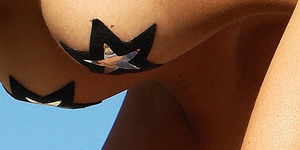
Go look but be aware that they're not all safe for work.
 The first thing that I noticed walking into the Varsity Theater for Information Society on Saturday was the progress they had made since Tuesday night in their renovations. There was a whole new set of stairs going up to the balcony. It was closed, but it hadn't been there on Tuesday. I'm really looking forward to seeing what the place looks like when they get the Shop-Vac and the workbench off of the second floor.
The first thing that I noticed walking into the Varsity Theater for Information Society on Saturday was the progress they had made since Tuesday night in their renovations. There was a whole new set of stairs going up to the balcony. It was closed, but it hadn't been there on Tuesday. I'm really looking forward to seeing what the place looks like when they get the Shop-Vac and the workbench off of the second floor.
Information Society has always held a special place in my music collection with their energetic synth-pop. I've never felt that they got the recognition they deserved in the international music scene, but I am comforted in the knowledge that their home town and mine contains a high proportion of fans. Most of the people I know who have heard InSoc like InSoc with only a few exceptions.
 InSoc is the first band I know of to use the Internet to expand the experience of their music. Nine Inch Nails' alternate reality game was innovative and imersive but that was decades after InSoc's online scavenger hunt. I never got excited enough, or maybe geeky enough, to connect my CD player to a modem to pull out the super-secret hidden content but I know people who did so I guess that makes me geeky by extension.
InSoc is the first band I know of to use the Internet to expand the experience of their music. Nine Inch Nails' alternate reality game was innovative and imersive but that was decades after InSoc's online scavenger hunt. I never got excited enough, or maybe geeky enough, to connect my CD player to a modem to pull out the super-secret hidden content but I know people who did so I guess that makes me geeky by extension.
Information Society played at The Varsity with a grand total of three opening bands. A local group named MilkBar opened the night. Unfortunately, either the mix was a little off or I was too close to the stage to hear it right, since Sarah Möeding's vocals were mostly drowned out by the rest of the band. Ignoring that, the music was good, if hard to describe. They're solidly synth-pop, but there are so many other influences, including Pat Benatar of all things that they pretty much define their own sub-genre. check them out on MySpace.
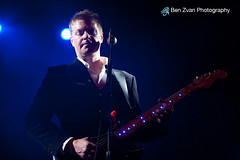 The second band was Faith Assembly. I described them as "Erasure meets Joy Division" when I first heard them and grew to like them more during their set. I enjoyed their music and they really worked to get the stodgy Minnesotans pumped up but I have to admit that the guitar with blue LEDs was the highlight of their set for me. Mark Stacy is a heck of a showman.
The second band was Faith Assembly. I described them as "Erasure meets Joy Division" when I first heard them and grew to like them more during their set. I enjoyed their music and they really worked to get the stodgy Minnesotans pumped up but I have to admit that the guitar with blue LEDs was the highlight of their set for me. Mark Stacy is a heck of a showman.
 The third and final warm up band was Moulin Noir which turned out to be a guy in a corset from Stockholm, Sweeden. His style of electro-goth new wave music worked really well but you could tell the audience was really getting a little tired of waiting. Note to self: try not to be the third opening act for a big-name band.
The third and final warm up band was Moulin Noir which turned out to be a guy in a corset from Stockholm, Sweeden. His style of electro-goth new wave music worked really well but you could tell the audience was really getting a little tired of waiting. Note to self: try not to be the third opening act for a big-name band.
When the stage was finally set for Information Society, there were projectors displaying "propaganda" on the back wall and the crowd got jumpy every time someone crossed the stage. Then a short woman with a long scarf walked up to the microphone, got up on her tippy toes and said "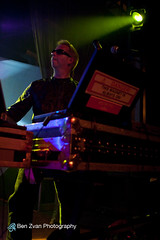 I am the original drum machine opperator for Information Society and the band has asked me to begin the show in the traditional Information Society manner." She then walked over to a rack of equipment and very deliberately, with her right index finger, pressed the "start" button and walked off stage.
I am the original drum machine opperator for Information Society and the band has asked me to begin the show in the traditional Information Society manner." She then walked over to a rack of equipment and very deliberately, with her right index finger, pressed the "start" button and walked off stage.
What can I say about Information Society? The beats were solid, the synthesizers were exquisitely synthesizing and the geeks were good to go. Three of the original four members were up on stage, Paul Robb working the synthesizers and sequencers, James Cassidy on bass and the occasional keyboard and Kurt Harland singing lead vocals and smacking the box of samples with a drumstick. Kurt performed what I consider to be a legitimate magic trick by conjouring not one but two Halls from an audience member after the first song and proceeded to sing around the hard, mentholated candy.
 About half way through the show, Kurt looked out into the audience and adressed a woman standing right up by the stage: "Paul says you're trying to look like me from the 80s." She nodded yes and he helped her up on stage so everyone could see her lab coat, stripy tie and wild hair. He took her lab coat, which didn't fit him very well, dug through the pockets and said "Hey! There's stuff in here!" Holding up her keys "are you trying to give me a hint here, because I'll need to have your address too... Oh, it's right here on your driver's license!"
About half way through the show, Kurt looked out into the audience and adressed a woman standing right up by the stage: "Paul says you're trying to look like me from the 80s." She nodded yes and he helped her up on stage so everyone could see her lab coat, stripy tie and wild hair. He took her lab coat, which didn't fit him very well, dug through the pockets and said "Hey! There's stuff in here!" Holding up her keys "are you trying to give me a hint here, because I'll need to have your address too... Oh, it's right here on your driver's license!"
There were three sets with costume changes between them and I didn't miss any of the songs they didn't play. With a repertoir as long as theirs, there was no way they could cover everything, especially after three opening acts, but they hit all the bases and bends of genre they've made over the years. The show ended pretty suddenly at the end of "What's On Your Mind" but I and my cohorts left the theater completely satisfied.
 The Squirrel Nut Zippers came to the attention of mainstream media outlets with the release of Hell, during the short-lived swing revival in the mid 1990s. After a long hiatus from each other, they have regrouped with most of the original members including Jimbo Mathus, Katherine Whalen and and Stu Cole and thrilled their fans with a tour.
The Squirrel Nut Zippers came to the attention of mainstream media outlets with the release of Hell, during the short-lived swing revival in the mid 1990s. After a long hiatus from each other, they have regrouped with most of the original members including Jimbo Mathus, Katherine Whalen and and Stu Cole and thrilled their fans with a tour.
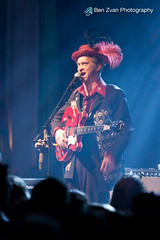 The show at the Varsity Theater on March 24th, 2009 began with the local jazz group Twin Cities Hot Club playing a set to warm up the audience. They played a good mix of swing classics while the crowd danced.
The show at the Varsity Theater on March 24th, 2009 began with the local jazz group Twin Cities Hot Club playing a set to warm up the audience. They played a good mix of swing classics while the crowd danced.
As I leaned against the stage, I noticed a large group of people had found a spot next to me to throw their jackets and change their shoes. As it turned out, there was a dance competition between the Hot Club set and the Squirrel Nut Zippers. Fun! After clearing an area in front of the stage, the band began playing for a good dozen couples. The music sped up, and the cohort of dancers steadily shrunk until two dancers remained. It was a great way to get the crowd hopping.
The Squirrel Nut Zippers are from the south. You wouldn't really know it from listening to their music except for the bluegrass influence but listening to them talk is a completely different story. Jimbo Mathus and his outrageous feathered hat sound distinctly like North Carolina if North Carolina were to get up on stage with an outrageous feathered hat.
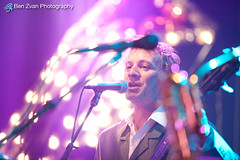 The show was everything I could have expected from the Squirrel Nut Zippers: the performers were all very good and the interaction was very compelling—each of them was energetic, and outstanding in their field. The set list included songs from the old days, new work yet to be published, and a little bluegrass ditty that gave Jimbo a chance to point out that they are from the Appalachians after all.
The show was everything I could have expected from the Squirrel Nut Zippers: the performers were all very good and the interaction was very compelling—each of them was energetic, and outstanding in their field. The set list included songs from the old days, new work yet to be published, and a little bluegrass ditty that gave Jimbo a chance to point out that they are from the Appalachians after all.
The audience was fairly typical for the shows I've been going to lately with a mix of ages and a dominance of winter-paled, sun deprived skin. Some of them danced, some pogoed and some just groved to the beat. Many didn't know all the songs but all knew some of the songs. When it was time for Hell, they all cheered and sang along. When Squirrel Nut Zippers comes to your town buy a ticket; you won't be dissapointed.
I remember seeing a show on the Discovery channel a while ago about people who had chosen to live their lives a cyborgs. Not with truly bio-embedded technology, but with helmets and cameras and four-fingered chording keyboards. The additional computer connectivity gave them access to metadata through specially coded signs that would display text in their heads-up display and allowed them to be constantly in contact with an Internet full of data.
MIT's Media Lab, as they do, has started to bring this to a practical end by making the technology interact with everyday items around you automatically.
This is an 8 minute video from TEDTalks. It gets really interesting when they show dialing the projected phone:
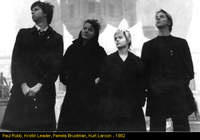 "Strange haircuts, cardboard guitars and computer samples." said Kurt Loder of MTV news; Truer words about Information Society have probably never been uttered... except maybe "Dude, your hair looks like a rake!"
"Strange haircuts, cardboard guitars and computer samples." said Kurt Loder of MTV news; Truer words about Information Society have probably never been uttered... except maybe "Dude, your hair looks like a rake!"
One of the many bands to emerge from the Minneapolis music scene, Information Society has a long history of unique dance and electro/freestyle music. They hit a rough patch in the 90s over a difference of musical vision and fell off the mainstream radar for a while, but the band maintained a strong underground following and continued its popularity in nightclubs worldwide.
After a five year break and shuffling the lineup a bit, Information Society began recording and releasing again in 1997. Their most recent tracks, from this decade, play like a more mature, fully realized version of their earlier work: Less eclectic but with just as much "pure energy." Re-releases of their work continually expose a dedicated fan base by reaching #1 on the Billboard Dance/Club charts.
Information Society will be at The Varsity Theater in Minneapolis with MOULIN NOIR and Faith Assembly on March 28, 2009. Tickets are on sale now at indietickets.com.
 March is historically the snowiest month in Minnesota and it seems like Minnesotans have forgotten, or never learned, how to drive in snow. As a public service, and to keep myself from being frustrated by other drivers and scared as I'm walking to work, I thought I'd provide some really basic information for the masses. This is what I see all the time and it's the reason for all the backups getting out of parking lots and off of side streets.It's also just as valid anywhere else where there's snow, including Florida and the entire southern hemisphere.
March is historically the snowiest month in Minnesota and it seems like Minnesotans have forgotten, or never learned, how to drive in snow. As a public service, and to keep myself from being frustrated by other drivers and scared as I'm walking to work, I thought I'd provide some really basic information for the masses. This is what I see all the time and it's the reason for all the backups getting out of parking lots and off of side streets.It's also just as valid anywhere else where there's snow, including Florida and the entire southern hemisphere.
Spinning your tires only makes your tires spin.
The basics: If you're sitting at a stop and the road is slippery. Don't give the car enough gas to spin the tires in the snow. If the tires are spinning, let up on the gas and let them grab some snow. If your tires dig out enough snow, they'll only reach ice. Ice is slipperier than snow.
The details: The coefficient of static friction is greater than the coefficient of dynamic friction. Here's a demonstration you can try at home.
You will need:
- A hard-cover book
- A ruler
- A second hard-cover book
- A small object that won't roll, let's say a deck of cards.
- Tape
- A notepad
- A pencil
- Tape the ruler to the spine of the first hard-cover book. Do it gently, so you can remove it later.
- Stand the book on end so that the ruler is sticking straight up with zero at the bottom.
- Set the other hard-cover book on its back, against the spine of the first so the longest shortest edge touches the ruler
- Place the deck of cards on the second book, touching the ruler.
- Lift the edge of the book touching the ruler up to make a ramp. When the deck of cards slides down the ramp, make a note of how high the book was touching the ruler.
- Put everything back where it was at the end of step 4.
- Repeat step 5, only this time keep giving the deck of cards a tiny push while you're raising the book. You may need a friend to do this part for you. Again, when the deck of cards slides down the book, make a note of how high you had raised the top of the ramp.
Congratulations! You just found the difference between the coefficient of static friction (step 5) and the coefficient of dynamic friction (step 7.) The number you wrote down in step 5, when the deck of cards was sitting still (static) should have been bigger than the number you wrote down in step 7, when the deck of cards was already sliding (dynamic.) To put it another way, if the deck of cards was already slipping the ramp didn't have to be as steep for it to keep slipping. That means that if your tires are slipping on snow, the snow doesn't have to be as slippery for them to keep slipping. Therefore, if your tires are slipping, the best way to get more traction from them is to stop them from slipping. You can do this by changing the surface you're driving on (hard) or by slowing down the tires until they stop slipping (easy.)
Get out there and practice this. Once you get good at keeping your tires from starting to slip on snow and ice, you'll be asking why this isn't a requirement for a Minnesota drivers license. I know I do. And when you get good enough, even steep, icy hills will not be a challenge for you.
It started with a simple set of words I heard on The Current, Minneapolis's Alt-eclectic music station.
Close to you, wishing we're conjoined at the tongue
Can you hear me thinking? I should stop.
As soon as I got home, I checked their website, found out "Desperate Guys" by The Faint fit the time-line of my drive, hit the iTunes music store and bought the album.
That weekend, I had a drive through central Minnesota for a photo shoot and took along my iPod with the new tracks on it. I was not disappointed by any song on it and listened to it two or three times on my drive to the-middle-of-nowhere and back.
The Faint have a new album out called "Faciinatiion" and they're on tour with Ladytron to support it. Tickets are on sale now for the show at First Avenue on April 2nd at 5:00. It's an 18+ show, so bring your ID. I'll be one of the guys with the camera and a big sparkly "Photo Pass" sticker on my shirt. Feel free to say "hi," I might even buy you a drink, especially if you don't have a black X on your hand.
Here are a couple videos to get you warmed up. I'll have a full review after the show.
The Faint - The Geeks Were Right:
Ladytron - Ghosts:
Yesterday, Gizmodo marked the 200th anniversary of Charles Darwin's birth with some posts showing gadget evolution.

With a readership as large as theirs, there had to be at least one person who didn't believe in evolution, right? In fact, one of the first comments on the camera post went a little like this:
...the pictures don't fit. that's natural progression not evolution. you have to have a picuture of fish and a frog and then something in between them that was like a mix. but guess what? you can't! unless you Photoshop it.
Evolution is hogwash. It's for people that can't accept there are some things outside our control or understanding. It's the most absurd theory ever and there is still no conclusive proof for it yet it's been adopted as fact. It can be proved imperically through the scientific process that itself claims is so important. It's ridiculous.[sic]
And thus proceeded a chain of comments on a gadget website debating the existance of evolution and a side-discussion on the subject of religion (which I felt was off-topic.) This is a typical argument for a lack evidence of transitional species indicating that evolution makes no sence. The logical mind says "I'll just show you a transitional species then." So another commenter gives a link to an article from 2006 that exactly meets the requirements of something between a fish and a frog.
I believe people adopt it because the signs of it are displayed throught history and even today, not to mention multiple decades of scientific study.
Also on a side note to your first post, on the guy between fish and frogs, please visit this article and "enlighten" yourself.
"Yay!" I thought, "I don't have to do the work to find that particular example and this argument must surely be over." It seemed like a perfect example of someone bringing a knife to a slap-fight. But the illogical mind, the one that doesn't believe evolution because there is no evidence, nearly knocks me off my chair after hitting my head on my keyboard.
that was a general example. no need to get out of shape.
Oh. My. Flying. Spagetti. Monster.
This shows what science is up against. People don't believe something because there's no proof. People see proof. People ignore proof. Evolution isn't the only example either. Global climate change and vaccination safety are right up there too. When you ask someone point-blank "what could I show you to change your mind?" the response is often "nothing would change my mind." and if you ask a scientist the same question, there's always an answer. A whopping 47% of Americans believe that evolution is false, the highest percentage in the world. How can we convince people to believe in reality rather than ideology?
Io9 has an article on turning Zira Island, possibly the Caspian Sea's most poluted area, into an eco-resort. I love the idea of using tourism as an excuse to clean up an area and treat it properly. But the first thing I noticed in the photos of the island were the abandoned ships off the north coast. They're one of the things that needs to be cleaned up before they can build billion-dollar hotels on the island.

But what I want is to go there and take pictures of the wrecked ships all over the place. It looks like an awesome environment to shoot in and a quick Google image search tells me nobody else has done it yet. Now... to convince my investors!
Comics
AppleGeeks
The Awkward Yeti
Chainsawsuit [new!]
Ctrl+Alt+Del
Doghousediaries
Doonesbury
Formal Sweatpants
FoxTrot
Happle Tea [new!]
Hyperbole and a Half
Indexed
Joy of Tech
Kate or Die!
Lunarbaboon
Our Valued Customers
RealLife
Romantically Apocalyptic
Saturday Morning Breakfast Cereal
Scenes From A Multiverse [new!]
A Softer World
Sci-ence
Sinfest
Three Panel Soul
Wondermark
XKCD
Blogs
Almost Diamonds Antihero As I See It Black and WTF Caerwyn Farm and Spirits The Catty Life Domestic Sluttery Engrish For Goodness Sake Gizmodo Greg Laden Le Zèbre Bleu Lefse and Kimchee Lifehacker Light-test Linux in Exile Man Bytes Blog Photography is Not a Crime Post Secret Photoshop Disasters
Arts
New Pictures 8: Sarah Jones
Minneapolis Institue of Arts
04/18/2013—02/02/2014 - Free
31 Years: Gifts from Martin Weinstein
Minneapolis Institue of Arts
11/02/2013—08/31/2014 - Free
New Pictures 9: Rinko Kawauchi
Minneapolis Institue of Arts
02/20/2014—08/10/2014 - Free
Finland: Designed Environments
Minneapolis Institue of Arts
05/10/2014—08/17/2014 - Free
Music
Nick Cave and the Bad Seeds
at State Theatre
06/21/2014 \ Doors 8:00pm
Please wait while my tweets load